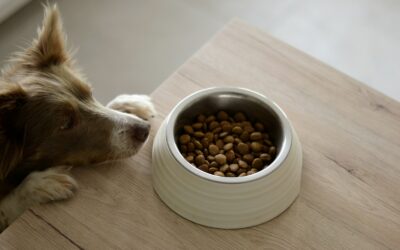As a dog owner, you might wonder, can dogs eat watermelon?
Watermelon is a beloved summer fruit, known for its refreshing taste and hydrating properties. It’s a staple at picnics, barbecues, and family gatherings. This blog post aims to answer that question and provide you with valuable insights into the health benefits and potential risks of feeding watermelon to your dog. We’ll explore everything from the nutritional benefits of watermelon to the safe ways to serve this fruit to your furry friend. By the end of this article, you’ll know whether this juicy treat can be a regular part of your pet’s diet.

Detailed Nutritional Benefits of Watermelon for Dogs: Can Dogs Eat Watermelon?
Watermelon is not only a hydrating snack but also a powerhouse of nutrients that can immensely benefit your dog’s health. Here are some detailed insights into the nutritional advantages of incorporating watermelon into your dog’s diet:
Rich in Vitamins
Watermelon is loaded with essential vitamins that support various bodily functions in dogs. It contains high levels of Vitamin A, which promotes healthy vision and skin, and Vitamin C, which boosts the immune system and helps in maintaining overall health. Additionally, Vitamin B6 found in watermelon plays a crucial role in brain development and function.
Packed with Minerals
This delicious fruit is also a good source of important minerals like potassium and magnesium. Potassium helps regulate fluid balance, nerve signals, and muscle contractions, while magnesium is vital for energy production and supports heart health.
Antioxidant Properties
Watermelon is abundant in antioxidants, such as lycopene and beta-carotene, which help combat oxidative stress by neutralizing free radicals. These antioxidants can reduce inflammation and support the overall immune function, contributing to the longevity and well-being of your dog.
High Fiber Content
The natural fiber content in watermelon aids in digestion and helps maintain a healthy gastrointestinal tract. Fiber can regulate bowel movements and prevent constipation, making it a great addition to your dog’s diet.
Amino Acids
Watermelon contains citrulline, an amino acid that can improve blood flow and reduce muscle soreness. While this benefit is more applicable to active or working dogs, it contributes to overall circulatory health in all canines.
By understanding the detailed nutritional benefits of watermelon, you can make informed decisions about how best to include it in your dog’s diet, ensuring they enjoy not only a tasty treat but also a healthful one.

Is Watermelon Safe for Dogs?: Can Dogs Eat Watermelon?
While watermelon is generally safe for dogs to eat, it’s important to be aware of certain potential hazards. One such risk is choking, especially if you offer large chunks of the fruit. Always cut watermelon into bite-sized pieces to ensure your dog’s safety.
Can Dogs Eat Watermelon Seeds and Rind?
Another concern is if dogs eat watermelon rind or not. While the flesh of the watermelon is safe for dogs, the seeds and rind can pose risks. Watermelon seeds, especially black ones, can cause an intestinal blockage, leading to serious health problems. Similarly, the rind is difficult to digest and can cause gastrointestinal upset. Always remove the seeds and rind before feeding watermelon to your dog.
Can Dogs Have Artificial Sweeteners?
It’s crucial to avoid giving your dog any watermelon products that contain artificial sweeteners, such as watermelon-flavored ice cream or candy. These substances can be harmful to dogs and may cause health issues like gastrointestinal upset or more severe problems.

How Much Watermelon Can a Dog Eat? Can Dogs Eat Watermelon?
While watermelon offers numerous health benefits for dogs, it’s crucial to serve it in appropriate quantities to prevent any potential digestive issues. As with any treat, moderation is key. Here are some guidelines to help determine the appropriate amount of watermelon to feed your dog:
Consider Your Dog’s Size
The quantity of watermelon your dog can safely consume largely depends on their size. Smaller dogs should be given smaller portions, while larger dogs can handle more. As a general rule, treats should only make up around 10% of your dog’s daily calorie intake.
Start Small
When introducing watermelon to your dog’s diet for the first time, start with small amounts. This allows you to monitor how your dog reacts to the new treat and to ensure they do not experience any adverse reactions such as diarrhea or an upset stomach.
Frequency of Feeding
Watermelon should be given as an occasional treat rather than a regular part of your dog’s diet. The high natural sugar content, although healthier than processed sugars, still requires moderation to avoid any potential weight gain or other health issues.
Monitor for Allergies
Although rare, some dogs may be allergic to certain fruits, including watermelon. Observing your dog for signs of allergies such as itching, swelling, or difficulty breathing is important every time you introduce new foods into their diet.
By following these guidelines, you can confidently determine the right amount of watermelon to share with your furry friend, ensuring they enjoy both the taste and the health benefits without overindulging.

The Benefits of Feeding Watermelon to Your Dog: Can Dogs Eat Watermelon?
Watermelon is an excellent hydrating snack, especially during the hot summer months. Its high water content helps keep your dog hydrated, which is crucial for maintaining overall health. Hydration is particularly important for active dogs that spend a lot of time outdoors.
Nutritional Benefits
In addition to hydration, watermelon offers several nutritional benefits. The vitamins and minerals in watermelon support various bodily functions, while the antioxidants help combat free radicals and reduce inflammation. These nutritional benefits make watermelon a healthy treat for your dog.
Low-Calorie Treat
Watermelon is a low-calorie treat, making it an ideal option for dogs that need to maintain a healthy weight. Unlike high-calorie snacks, watermelon won’t contribute to weight gain, allowing you to indulge your dog’s cravings without guilt.

Creative Ways to Serve Watermelon to Your Dog: Can Dogs Eat Watermelon?
Serving watermelon to your dog doesn’t have to be plain and simple. There are several creative ways to incorporate this hydrating and nutritious fruit into your dog’s diet. Here are some fun ideas to get you started:
Watermelon Popsicles
On a hot summer day, nothing beats a refreshing popsicle, and dogs love them too! Blend seedless watermelon chunks until you have a smooth puree, then pour the mixture into popsicle molds or ice cube trays. Freeze until solid, and you have an easy-to-serve, cooling treat for your dog.
Watermelon Salad
Combine watermelon with other dog-safe fruits and vegetables to create a delicious and nutritious salad. Mix small, seedless chunks of watermelon with blueberries, cucumber, and a sprinkle of parsley for a hydrating and vitamin-packed snack.
Watermelon KONG Filling
For a longer-lasting treat, stuff a KONG toy with watermelon. Cut seedless watermelon into small pieces and pack them inside the KONG. You can also blend the watermelon into a puree and freeze it inside the toy for an extended, cooling challenge.
Watermelon and Yogurt Mash
For a refreshing treat, mash some seedless fresh watermelon and mix it with a spoonful of plain, lactose-free yogurt. This creamy and sweet combination is an excellent treat to encourage hydration, and the yogurt adds a dose of probiotics for gut health.
Watermelon Sorbet
Can dogs eat frozen watermelon? DUH! Another way to serve watermelon is by making a simple sorbet. Puree seedless watermelon and freeze it in a shallow dish. Once frozen, scoop small amounts to serve your dog. This is a wonderful way to provide a refreshing and hydrating snack.
Watermelon Smoothie
Blend seedless watermelon with some ice and a small amount of water to create a smoothie. This can be served as a chilled drink or used as a topper for your dog’s regular kibble for added hydration and flavor.
Dehydrated Watermelon
For a chewy snack, dehydrate seedless watermelon slices. Lay thin slices on a dehydrator tray and dehydrate until they become leathery. Dehydrated watermelon slices are a portable and tasty treat for dogs on the go.
By exploring these different serving methods, you can keep your dog excited about this nutritious fruit. Remember always to supervise your dog when giving them new treats and consult your veterinarian if you have any concerns about introducing watermelon into their diet.

Potential Risks of Feeding Watermelon: Can Dogs Eat Watermelon?
While watermelon is generally safe, overfeeding can lead to an upset stomach. Symptoms may include diarrhea, vomiting, and abdominal discomfort. Always monitor your dog’s reaction and adjust the portion size accordingly.
Intestinal Blockage
Avoid giving your dog watermelon seeds or rind, as they can cause an intestinal blockage. This condition requires immediate veterinary attention and can be life-threatening if not treated promptly.
Allergic Reactions
Although rare, some dogs may be allergic to watermelon. Signs of an allergic reaction include itching, swelling, and difficulty breathing. If you notice any of these symptoms, contact your vet immediately.

Snouts and Stouts Indoor Dog Park and Bar
For dog owners looking for a fun and engaging way to treat their furry companions while socializing with fellow dog enthusiasts, look no further than Snouts and Stouts Indoor Dog Park and Bar. This unique establishment offers a safe, climate-controlled environment where dogs can play freely, and their owners can relax with a refreshing drink in hand.
Conclusion: Can Dogs Eat Watermelon?
In conclusion, watermelon can be a safe and healthy treat for your dog when served correctly. Its high water content, vitamins, and antioxidants make it a nutritious option, while its refreshing taste is sure to delight your furry friend. However, it’s essential to remove the seeds and rind and feed watermelon in moderation to avoid any potential risks. By following these guidelines, you can confidently offer watermelon to your dog and enjoy the benefits of this delicious fruit together.
If you have any concerns or questions about introducing new foods into your dog’s diet, always consult your veterinarian. And if you’re looking for more tips on keeping your dog healthy and happy, join our community of pet lovers and stay updated with the latest pet care advice.
Happy feeding!




